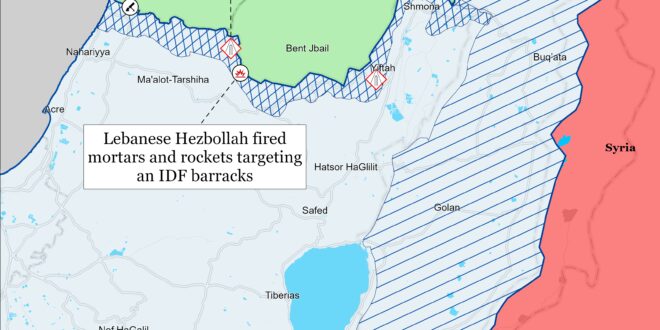Several Iranian military leaders boasted on May 1 that they could strike Israel with a drone and missile attack much larger than what they launched on April 13 and thus inflict greater damage on Israel.[i] IRGC Commander Maj. Gen. Hossein Salami suggested that Iran could have launched two or three additional waves of drones and missiles against Israel and that each successive wave would have reduced the efficacy of US and partner air defenses.[ii] IRGC Aerospace Force Commander Brig. Gen. Amir Ali Hajji Zadeh similarly asserted that his service used “only 20 percent of [its] strength” in the April 13 drone and missile attack.[iii] CTP-ISW has previously assessed that Iran modeled its April 13 attack on recent Russian attacks in Ukraine and that Iran designed its strike package to defeat Israeli air defenses, even though the United States and its partners intercepted around 99 percent of the projectiles. Iranian leaders are almost certainly studying the April 13 attack to learn lessons and understand how to defeat US and partner air defenses in the future.[iv]
Several senior Iranian military officers, including Salami, separately framed the April 13 drone and missile attack as successful in that it demonstrated Iranian willingness to now attack Israel directly.[v] These statements echo similar remarks from Supreme Leader Ali Khamenei on April 22, during which he praised senior military commanders for their role in the attack and said that “the willpower of the Iranian nation and armed forces” matters more than how many munitions Iran launched or how many munitions hit their target.[vi] These statements are also consistent with Salami and other regime officials saying in recent weeks that Iran has adopted a new policy of targeting Israel directly in retaliation for Israeli attacks on Iranian interests.[vii]
Hamas asked international mediators to clarify the terms of two sections of the new Egyptian-proposed ceasefire proposal, according to an Egyptian official speaking to Israeli media.[viii] Hamas requested assurances that the second stage of the deal would facilitate the complete withdrawal of Israeli forces from the Gaza Strip and requested clarification on the unconditional return of displaced Gazans to the northern Gaza Strip.[ix] Egyptian sources speaking to a United Kingdom-based, Qatari-owned outlet said that an Israeli delegation arrived in Cairo on April 30 to discuss Hamas’ concerns and amendments to the deal.[x] The Egyptian officials expect that Hamas will deliver its final response to the deal ”at the end of the week.”[xi]
Key Takeaways:
- Iran: Iranian military leaders emphasized that they could hit Israel with a drone and missile attack much greater than what they launched on April 13. Iranian leaders are likely studying their April 13 attack to learn lessons and understand how to more effectively penetrate US and partner air defenses.
- Gaza Strip: Hamas is considering an Egyptian-proposed ceasefire deal and has requested clarification on some of its contents. Egyptian officials expect a Hamas response to the deal in the coming days. Hamas has not changed its maximalist demands since December 2023.
- West Bank: Jordan accused Israeli settlers of attacking a humanitarian aid convoy traveling through the West Bank to the Gaza Strip. The IDF afterward imposed a “closed military zone” where the attack occurred.
- Yemen: The United States conducted a preemptive strike targeting a Houthi uncrewed surface vessel in Yemen. The United States determined that the vessel posed an imminent threat to US forces and nearby commercial traffic.
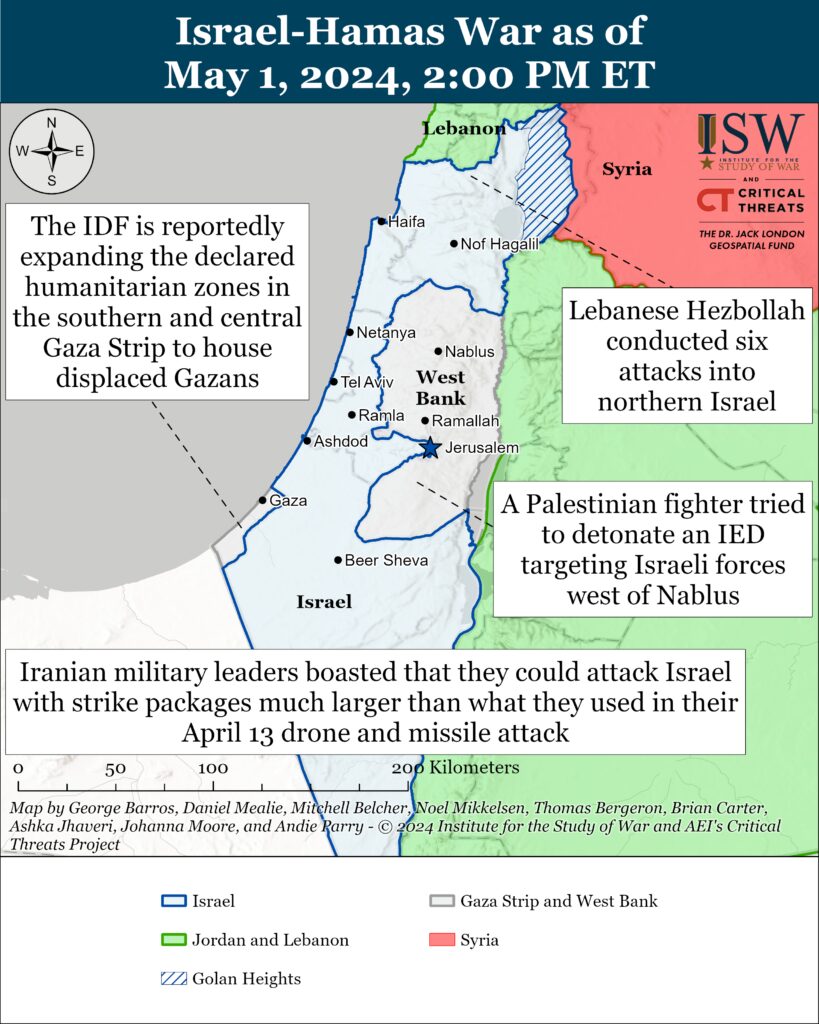
Gaza Strip
Axis of Resistance objectives:
Erode the will of the Israeli political establishment and public to sustain clearing operations in the Gaza Strip
Reestablish Hamas as the governing authority in the Gaza StripThe Israel Defense Forces (IDF) Air Force struck several Palestinian fighters in the central Gaza Strip on May 1. The IDF 99th Division directed a strike on a Hamas fighter who had fired rockets targeting Israeli forces along the Netzarim corridor.[xii] The IDF Air Force also stuck two Palestinian fighters approaching Israeli forces in the central Gaza Strip.[xiii]
Local Palestinian sources reported that the IDF targeted several areas of the central and southern Gaza Strip on May 1. Local sources reported that Israeli forces fired artillery and small arms in Bureij, eastern Rafah, and Nuseirat.[xiv]
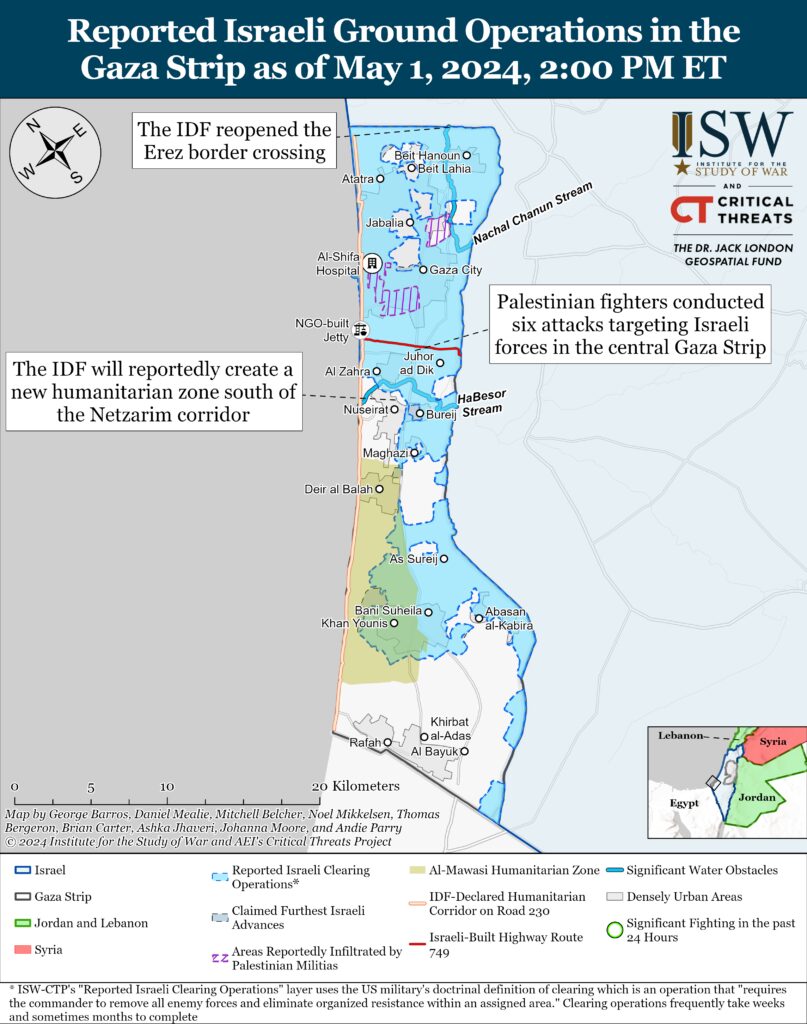
Palestinian militias targeted Israeli forces with mortar and rocket fire at least six times along the Netzarim corridor on May 1.[xv] Palestinian militias have claimed almost daily indirect fire attacks targeting Israeli forces near the Netzarim corridor since April 18.[xvi]
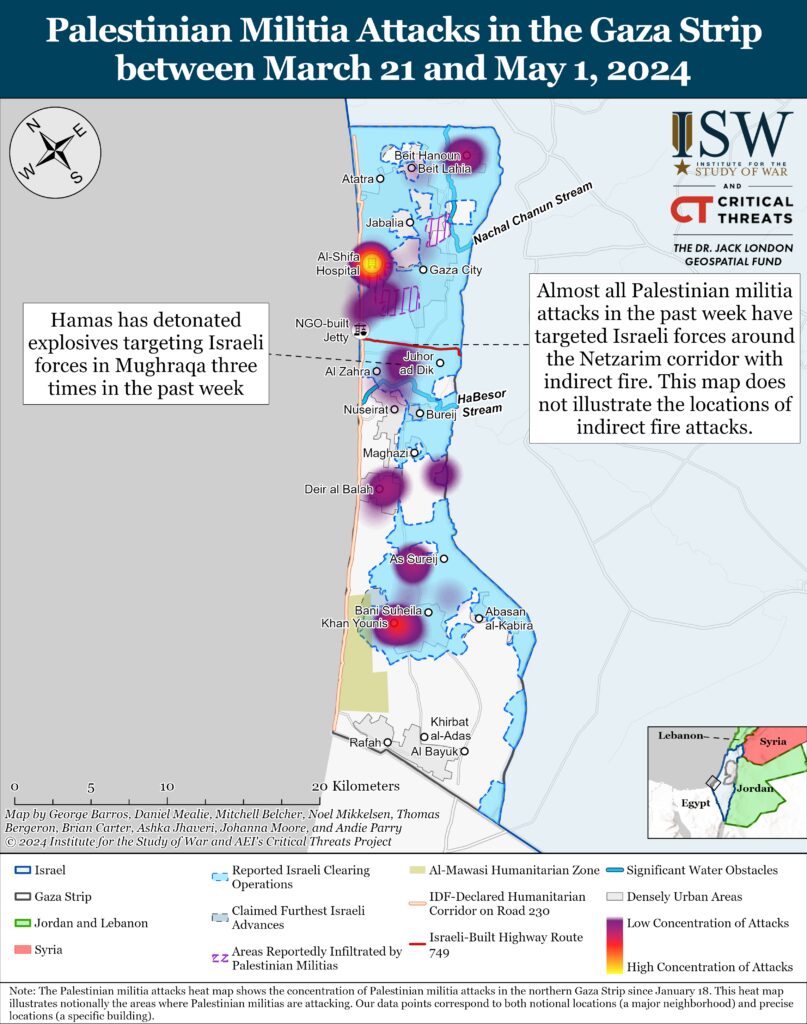
The IDF is reportedly expanding the declared humanitarian zones in the southern and central Gaza Strip to house displaced Gazans currently sheltering in Rafah.[xvii] The IDF is expected to declare a new “safer“ humanitarian zone just south of the Netzarim corridor in the central Gaza Strip, according to an Israeli Army Radio correspondent.[xviii] The new zone is expected to extend south from Wadi Gaza to the western outskirts of Bureij and Nuseirat.[xix] The zone is adjacent to the Netzarim corridor that the IDF fully controls.[xx] The IDF previously announced an expansion to the al Mawasi humanitarian zone on April 28.[xxi] The al Mawasi expansion extends from the formerly declared humanitarian zone eastward to the Salah ad Din road and northward into Deir al Balah. Netanyahu confirmed on April 30 that the IDF had begun the humanitarian evacuation of Rafah.[xxii] The Israel Army Radio correspondent said that about 150,000 Gazans have already evacuated from Rafah—presumably since the IDF withdrew from the southern Gaza Strip on April 7.[xxiii]
An Israeli Army Radio correspondent noted that the new humanitarian zone in the central Gaza Strip would be a declared combat-free zone like the al Mawai zone. The zone is also near a humanitarian aid distribution area on the coast of the central Gaza Strip that the IDF began constructing in April 2024 to service the US-constructed pier off the coast.[xxiv]The proposed humanitarian zone sits atop uncleared areas of the Gaza Strip and near intact Hamas battalions in the central camps area, however.[xxv]
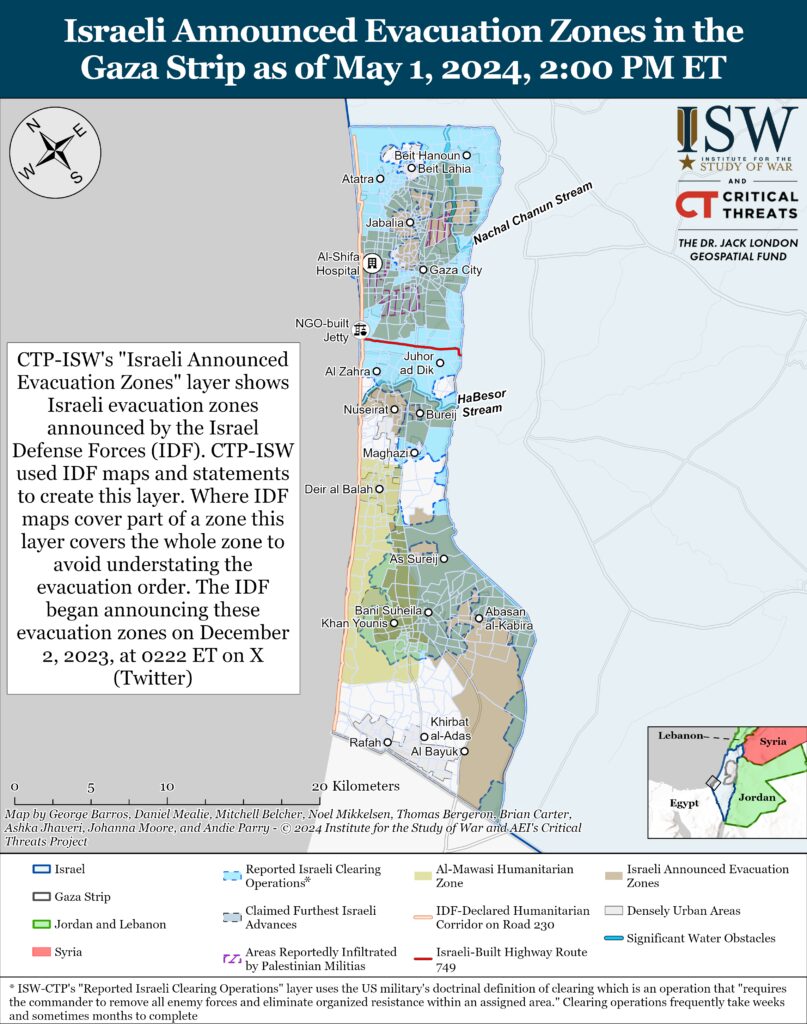
Israeli Prime Minister Benjamin Netanyahu told US Secretary of State Antony Blinken on May 1 that Israel will move forward with a clearing operation into Rafah if “Hamas continues to condition a hostage deal on ending the war,” according to US and Israeli government sources speaking to Axios.[xxvi] Israeli officials said that Netanyahu reiterated that Israel will not commit to ending the war in the Gaza Strip. Israel has not agreed to the Egyptian-proposed ceasefire, despite being involved in its formulation.
Israeli Defense Minister Yoav Gallant said that the IDF “is prepared to carry out any operational mission in the Rafah area” after a meeting with US Secretary of State Antony Blinken.[xxvii] Gallant’s comment comes a day after several Israeli political and military officials suggested that an Israeli clearing operation into Rafah could begin within the next few days.[xxviii]
Chinese Deputy Foreign Affairs Minister Deng Li met with senior Hamas officials in Beijing on April 28.[xxix] Hamas said that the officials discussed efforts to reach a ceasefire, increase humanitarian aid to the Gaza Strip, and Chinese efforts to “unite the Palestinian ranks,” referring to Chinese-hosted reconciliation talks between Hamas and Fatah on April 26.[xxx] Hamas said that Deng expressed “readiness to provide everything necessary” to facilitate Palestinian unity and support Palestine in international forums. CTP-ISW previously assessed that the success of China’s talks to facilitate Hamas’ inclusion in the Palestinian Authority would result in a Hamas-influenced government in the West Bank and the Gaza Strip.[xxxi]
The Coordinator of Government Activities in the Territories (COGAT)—a department within the Israeli Defense Ministry—opened the Erez border crossing into the northern Gaza Strip on May 1.[xxxii] The IDF said that 30 humanitarian aid trucks from Jordan transited through the Erez crossing “after a careful security check.”[xxxiii] The opening of the crossing is meant to accelerate the delivery of humanitarian aid to the northern Gaza Strip. The Israeli war cabinet reportedly ordered the opening of the crossing on April 5, but IDF engineering forces had to first rebuild roads and other infrastructure in the area before opening the crossing.[xxxiv] The Erez crossing had been closed since the start of the Israel-Hamas war.[xxxv]
Hamas launched four rockets from the Gaza Strip at a town in southern Israel on May 1.[xxxvi] The IDF said the rockets landed in open areas and caused no damage.[xxxvii]
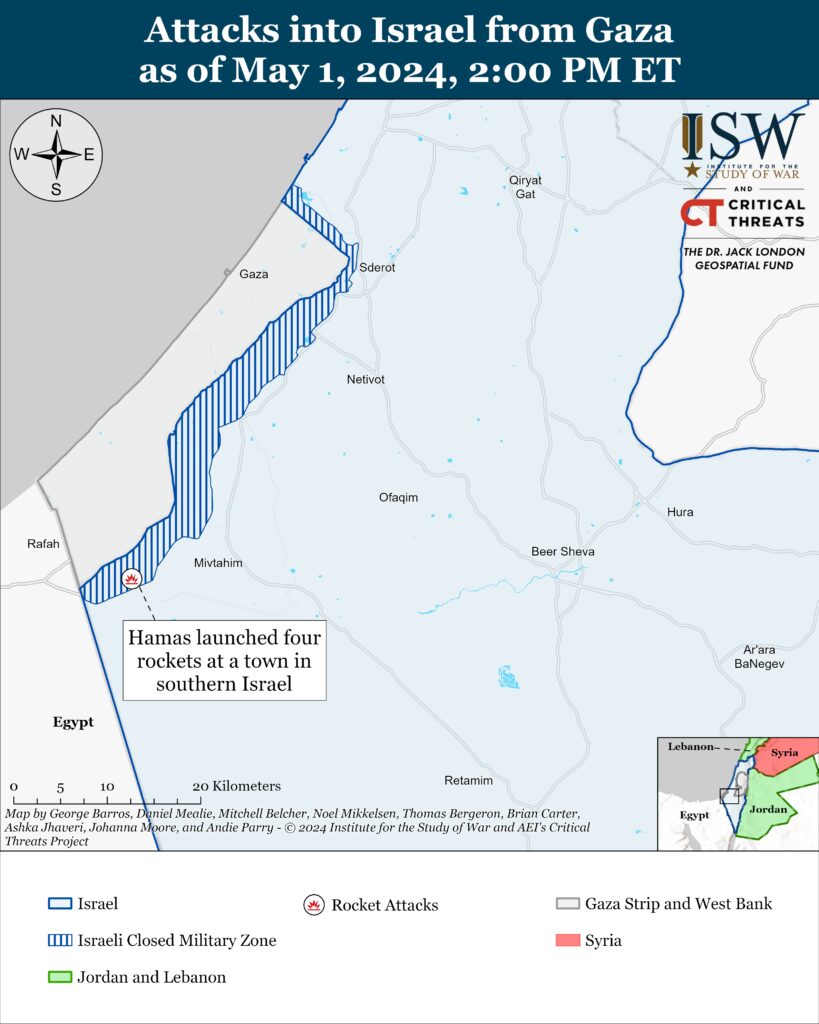
Recorded reports of attacks; CTP-ISW cannot independently verify impact.
West Bank
Axis of Resistance objectives:
Establish the West Bank as a viable front against IsraelIsraeli forces have engaged Palestinian fighters in at least one location in the West Bank since CTP-ISW’s last information cutoff on April 30. A Palestinian fighter tried to detonate an improvised explosive device (IED) targeting Israeli forces in Azzun, west of Nablus, on May 1.[xxxviii] Israeli forces later destroyed the IED.[xxxix]
Israeli forces detained nine wanted individuals across the West Bank on May 1.[xl]
The Jordanian Foreign Affairs Ministry released a statement claiming that Israeli settlers blocked and attacked Jordanian aid trucks crossing into the West Bank on May 1.[xli] The convoys were delivering humanitarian aid to the Gaza Strip.[xlii] The IDF imposed a “closed military zone” around the Allenby Bridge Crossing, where the incident occurred, after the settlers blocked and attacked the trucks.[xliii] The Jordanian Foreign Affairs Ministry stated that the settlers inflicted ”material damage” to the aid trucks but did not provide further details.[xliv] The Jordanian Foreign Affairs Ministry stated that the aid convoys continued their journey to the Gaza Strip after the incident.[xlv] Israeli media reported that Israeli protesters continued to block the passage to Jordanian trucks after the IDF closed the area.[xlvi]
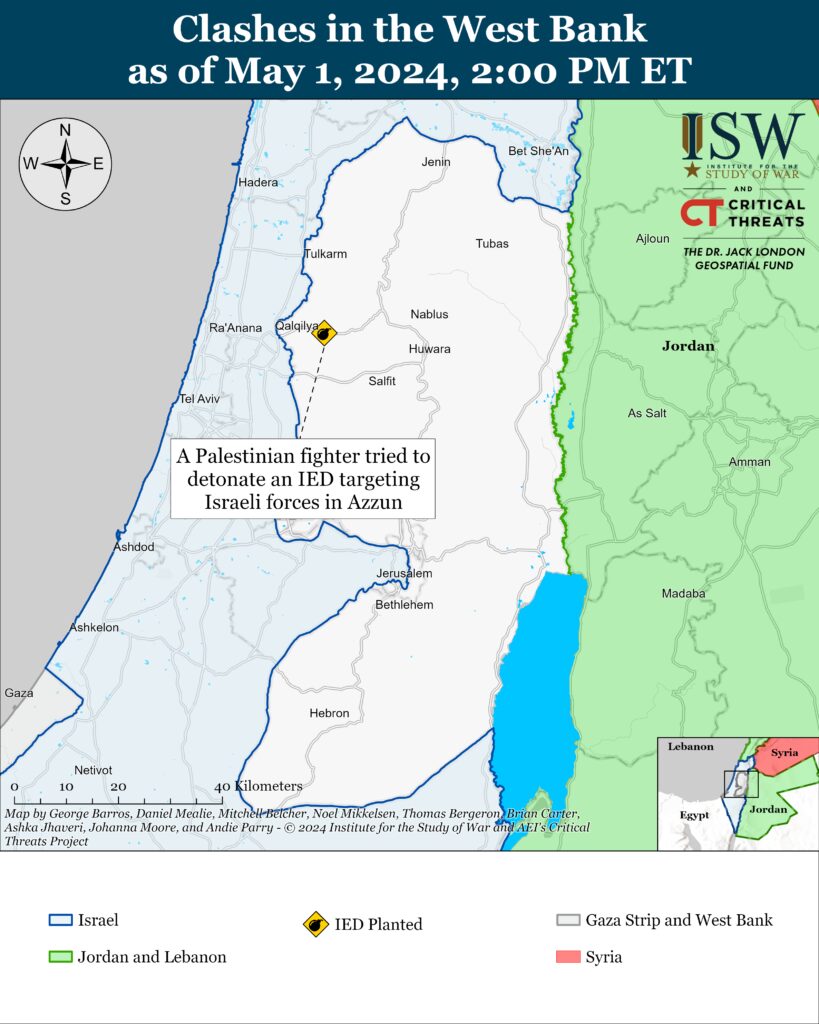
This map is not an exhaustive depiction of clashes and demonstrations in the West Bank.
Southern Lebanon and Golan Heights
Axis of Resistance objectives:
Deter Israel from conducting a ground operation into Lebanon
Prepare for an expanded and protracted conflict with Israel in the near term
Expel the United States from SyriaLebanese Hezbollah has conducted at least six attacks from southern Lebanon into northern Israel since CTP-ISW’s last data cutoff on April 30.[xlvii]
IDF Chief of Staff Gen. Herzi Halevi visited the Israel-Lebanon border on May 1.[xlviii] Halevi met with several commanders, including IDF Northern Command Commander Maj. Gen. Uri Gordin.[xlix] Halevi said that the IDF is conducting ”offensive defense” in northern Israel and that the IDF is “preparing an attack“ in the region, without specifying further.[l]
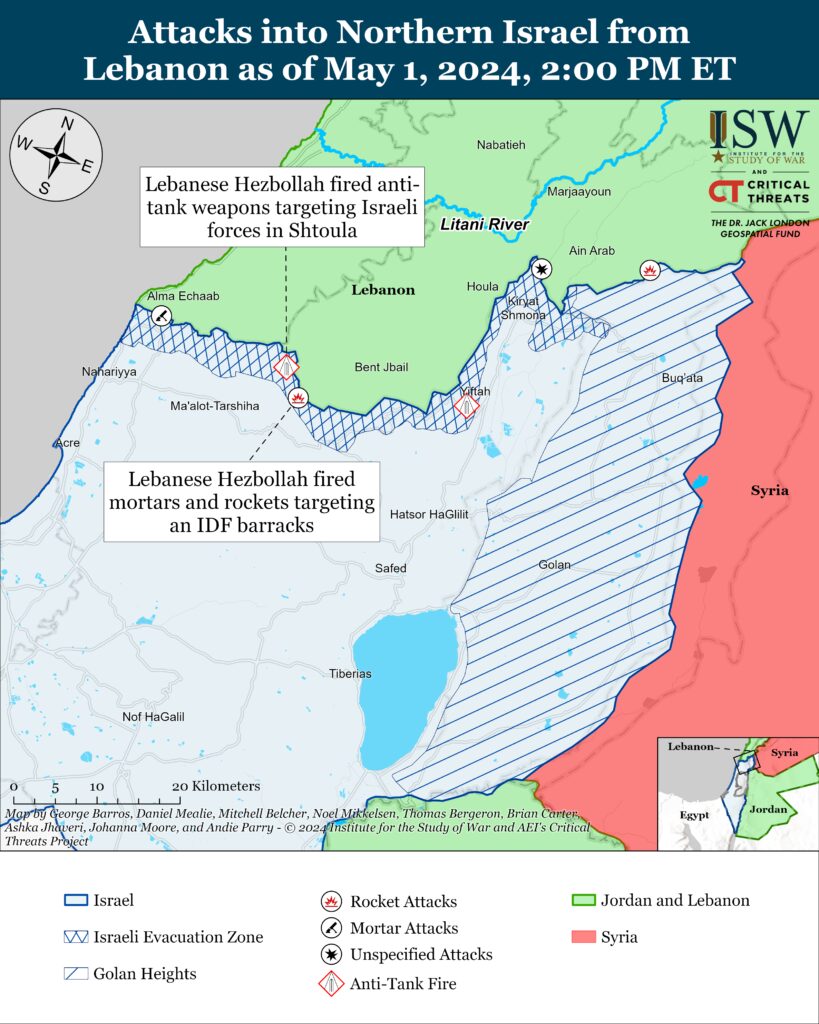
Recorded reports of attacks; CTP-ISW cannot independently verify impact.
Iran and Axis of Resistance
An Iraqi Sadrist politician, Bahaa al Araji, claimed in an interview on May 1 that Iranian-backed Iraqi militias may resume their attacks on US forces on May 4 or 5.[li] It is unclear, however, whether Araji was speculating or referencing private information that he has. IRGC Quds Force Commander Brig. Gen. Esmail Ghaani ordered the militias, including Kataib Hezbollah and Harakat Hezbollah al Nujaba, to suspend attacks targeting US forces in February 2024 after a one-way drone attack killed three US personnel in northeastern Jordan.[lii] Kataib Hezbollah and Harakat Hezbollah al Nujaba “fiercely resisted” Ghaani’s order to stop attacks but ultimately complied.[liii] Iranian-backed Iraqi militias have indicated in recent weeks a desire to resume regular attacks after Iraqi Prime Minister Mohammad Shia al Sudani traveled to Washington, DC. The militias presumably wanted Sudani to agree to a concrete timeline for the removal of US forces from Iraq. CTP-ISW has assessed that militia leadership has been divided on whether to resume attacks since Sudani’s visit.[liv]
US Central Command (CENTCOM) reported that it conducted a preemptive strike targeting an uncrewed surface vessel (USV) in Houthi-controlled areas of Yemen on April 30.[lv] CENTCOM determined that the USV presented an imminent threat to US coalition forces and commercial vessels in the region.
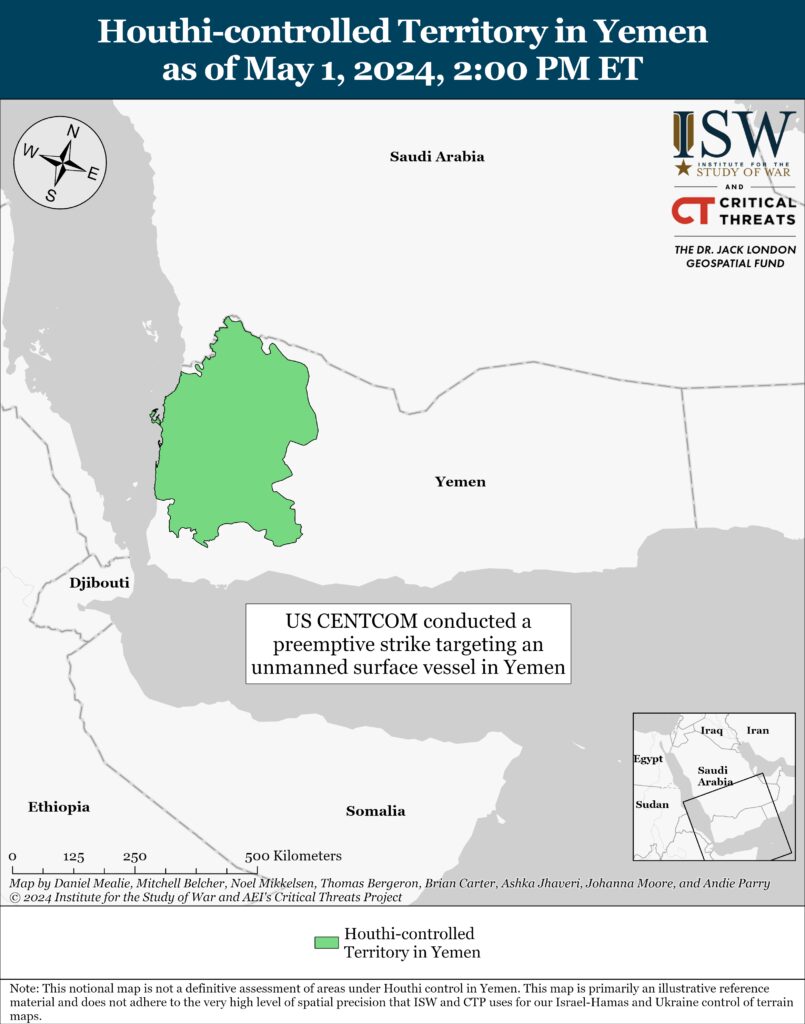
Iranian officials and state media denied a recent BBC report detailing how Iranian security forces molested and killed a 16-year-old girl in September 2022.[lvi] The BCC report, citing a “highly confidential” IRGC document, detailed how three members of Ansar-e Hezbollah—a semi-official, vigilante group—abducted, sexually assaulted, and killed Nika Shakarami for participating in the Mahsa Amini protests in September 2022.[lvii] Iranian Interior Minister Ahmad Vahidi and IRGC-affiliated media described the report as “fake” and “ridiculous” on May 1.[lviii] The Tehran Prosecutor’s Office separately filed criminal charges against unspecified activists and journalists who recirculated the report for “publishing false and insulting propaganda against the regime.”[lix]
Iran faces worsening economic conditions that risk driving large-scale, anti-regime unrest. The Iranian rial has continued to devalue, hitting a record low of 705,000 rial to the dollar on April 14.[lx] Retirees protested in several cities on May 1 to complain about the deteriorating conditions.[lxi] Anti-regime outlets reported that citizens said that they cannot afford basic necessities, such as electricity, gas, and water.[lxii] Poor economic performance and regime mismanagement has long driven widespread unrest in Iran, such as the countrywide gasoline protests in late 2019.[lxiii] This domestic unrest often adopts explicitly revolutionary tones focused on overthrowing the Islamic Republic. Iran’s worsening economic conditions are compounded by growing frustration with the renewed regime crackdown on mandatory veiling. The Iranian Law Enforcement Command (LEC) resumed enforcing the mandatory hijab law on April 13 after reducing its enforcement during and after the 2022-2023 Mahsa Amini protests.[lxiv] Iranians protested the arrest of an unveiled woman at a metro station in Tehran on April 23, marking one of the first hijab-related protests in Iran since the renewed crackdown on April 13.[lxv]
 Eurasia Press & News
Eurasia Press & News
